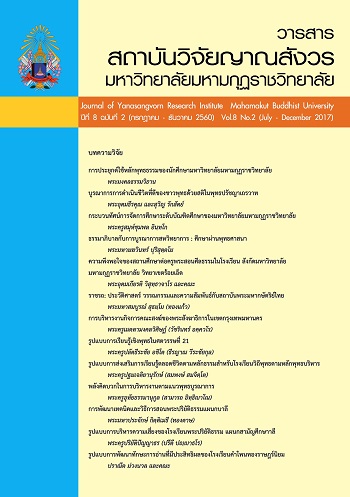The Critique of the Causes of Corruption According to Theravada Buddhist Philosophy
Main Article Content
Abstract
This article has objectives to critique the concept of the cause of corruption. Or use the influence in the wrong way. Too many benefits and bureaucracy. That is a cause damage to society and made the system broken. That is the cause of deprived society. Although fraud is detected but no offender can be found. So it is a serious problem. This article, it was found that the cause of corruption. If interpreted according to the concept of Thomas Hobbes and Nikolai Machiavelli are found to have the same view of human selfishness. Because of the foundation of the idea of faith. Man is bad and like to find things as desired In addition, man is also a fool. Letting this thought fall under the rule of desire. But Jean Jacques Rousseau sees that the cause of corruption is caused by external causes, which are the social environment. The basic idea is to believe that human condition is born with good nature. But humans do evil because society is in a state of lack of discipline. There is cruelty and exploitation to each other. The causes of corruption according to Buddhist Theravada philosophy. Seems likely to believe Cause of Corruption It comes from the internal factors as well as the concepts of Hobbes and Machiavelli. In analyzing, Author was found that the concepts of Hobbes and Machiavelli. involve only noble person. For general human. The causes of corruption can occur both internally and externally, namely, Kilesa kama, and external causes such as the object, namely, Vatthu kama, and the environment. Therefore, the framework of thinking about the causes of corruption in Buddhist philosophy has a concept of “Dualism”
Article Details
References
จารุวรรณ สุขุมาลพงษ์ และคณะ. (2556). แนวโน้มของการคอรัปชั่นในประเทศไทย. กรุงเทพฯ: สำนักงานเลขาธิการสภาผู้แทนราษฎร.
จารุวรรณ สุขุมาลพงษ์ และคณะ. (2556). แนวโน้มของการคอรัปชั่นในประเทศไทย. กรุงเทพฯ: สำนักงานเลขาธิการสภาผู้แทนราษฎร.
ไทยรัฐ. (2559). “แนวความคิดและทฤษฎีที่เกี่ยวข้องกับการฉ้อราษฎร์บังหลวง (ตอนที่ 1)”, สืบค้นเมื่อ 16 พฤษภาคม 2559.
พระพรหมคุณาภรณ์ (ป.อ. ปยุตฺโต). (2552). พจนานุกรมพุทธศาสน์ฉบับประมวลศัพท์. พิมพ์ครั้งที่ 12. กรุงเทพฯ : สำนักพิมพ์จันทร์เพ็ญ.
เรืองวิทย์ เกษสุวรรณ. (2553). ความรู้เบื้องต้นเกี่ยวกับรัฐประศาสนศาสตร์. พิมพ์ครั้งที่ 3. กรุงเทพฯ : บริษัท บพิธการพิมพ์จำกัด.
สุชาตา นนทวงศ์. (2559). “รายงานวิจัยเรื่องทัศนะและรูปแบบการคอรัปชั่นในสำนักงานการศึกษาแห่งหนึ่งในจังหวัดอุบลราชธานี”. สืบค้นเมื่อ 16 พฤษภาคม 2559
สมบัติ จันทรวงศ์ (แปล). (2542). เจ้าผู้ปกครอง (The Prince). กรุงเทพฯ : โครงการจัดพิมพ์คบไฟ.
Christman, J. (2002). Social and Political Philosophy : A Contemporary Introduction. New York : Routledge.
Hobbes, T. (1996). Hobbes : Leviathan. Trans. and ed. by Richard Tuck. Cambridge : Cambridge University Press.
Jean-Jaque Russeau. (1992). Social Contract and Other Political Writings. trans. and ed. by Victor Gourevich. Cambridge University Press : Cambridge.
Transparency International, (2011). “The corruption perceptions index measures the perceived levels of public sector corruption in countries and territories around the world”. สืบค้นเมื่อ 16 พฤษภาคม 2559 http://www.transparency.org/cpi>
UNODC. (2009). “Corruption Compendium of international legal instrument on corruption. United Nations Office on Drugs and Crime, Vienna International Center”. สืบค้นเมื่อ 15 พฤษภาคม 2559
Vatsyayan, K. (1986). Made Easy Ethics. New Delhi: Kedar Nath Ram Nath.


